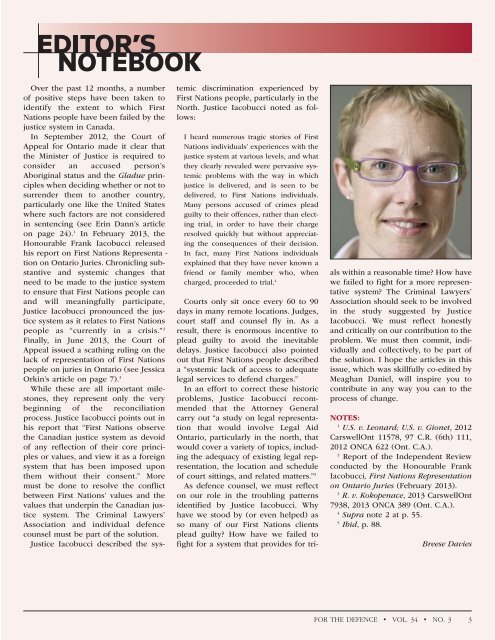FTD_Vol34_No3_web
FTD_Vol34_No3_web
FTD_Vol34_No3_web
Create successful ePaper yourself
Turn your PDF publications into a flip-book with our unique Google optimized e-Paper software.
For the Defence_34-3_Layout 1 13-08-16 10:40 AM Page 3<br />
Over the past 12 months, a number<br />
of positive steps have been taken to<br />
identify the extent to which First<br />
Nations people have been failed by the<br />
justice system in Canada.<br />
In September 2012, the Court of<br />
Appeal for Ontario made it clear that<br />
the Minister of Justice is required to<br />
consider an accused person’s<br />
Aboriginal status and the Gladue principles<br />
when deciding whether or not to<br />
surrender them to another country,<br />
particularly one like the United States<br />
where such factors are not considered<br />
in sentencing (see Erin Dann’s article<br />
on page 24). 1 In February 2013, the<br />
Honourable Frank Iacobucci released<br />
his report on First Nations Representa -<br />
tion on Ontario Juries. Chronicling substantive<br />
and systemic changes that<br />
need to be made to the justice system<br />
to ensure that First Nations people can<br />
and will meaningfully participate,<br />
Justice Iacobucci pronounced the justice<br />
system as it relates to First Nations<br />
people as “currently in a crisis.” 2<br />
Finally, in June 2013, the Court of<br />
Appeal issued a scathing ruling on the<br />
lack of representation of First Nations<br />
people on juries in Ontario (see Jessica<br />
Orkin’s article on page 7). 3<br />
While these are all important milestones,<br />
they represent only the very<br />
beginning of the reconciliation<br />
process. Justice Iacobucci points out in<br />
his report that “First Nations observe<br />
the Canadian justice system as devoid<br />
of any reflection of their core principles<br />
or values, and view it as a foreign<br />
system that has been imposed upon<br />
them without their consent.” More<br />
must be done to resolve the conflict<br />
between First Nations’ values and the<br />
values that underpin the Canadian justice<br />
system. The Criminal Lawyers’<br />
Association and individual defence<br />
counsel must be part of the solution.<br />
Justice Iacobucci described the systemic<br />
discrimination experienced by<br />
First Nations people, particularly in the<br />
North. Justice Iacobucci noted as follows:<br />
I heard numerous tragic stories of First<br />
Nations individuals’ experiences with the<br />
justice system at various levels, and what<br />
they clearly revealed were pervasive systemic<br />
problems with the way in which<br />
justice is delivered, and is seen to be<br />
delivered, to First Nations individuals.<br />
Many persons accused of crimes plead<br />
guilty to their offences, rather than electing<br />
trial, in order to have their charge<br />
resolved quickly but without appreciating<br />
the consequences of their decision.<br />
In fact, many First Nations individuals<br />
explained that they have never known a<br />
friend or family member who, when<br />
charged, proceeded to trial. 4<br />
Courts only sit once every 60 to 90<br />
days in many remote locations. Judges,<br />
court staff and counsel fly in. As a<br />
result, there is enormous incentive to<br />
plead guilty to avoid the inevitable<br />
delays. Justice Iacobucci also pointed<br />
out that First Nations people described<br />
a “systemic lack of access to adequate<br />
legal services to defend charges.”<br />
In an effort to correct these historic<br />
problems, Justice Iacobucci recommended<br />
that the Attorney General<br />
carry out “a study on legal representation<br />
that would involve Legal Aid<br />
Ontario, particularly in the north, that<br />
would cover a variety of topics, including<br />
the adequacy of existing legal representation,<br />
the location and schedule<br />
of court sittings, and related matters.” 5<br />
As defence counsel, we must reflect<br />
on our role in the troubling patterns<br />
identified by Justice Iacobucci. Why<br />
have we stood by (or even helped) as<br />
so many of our First Nations clients<br />
plead guilty? How have we failed to<br />
fight for a system that provides for trials<br />
within a reasonable time? How have<br />
we failed to fight for a more representative<br />
system? The Criminal Lawyers’<br />
Association should seek to be involved<br />
in the study suggested by Justice<br />
Iacobucci. We must reflect honestly<br />
and critically on our contribution to the<br />
problem. We must then commit, individually<br />
and collectively, to be part of<br />
the solution. I hope the articles in this<br />
issue, which was skillfully co-edited by<br />
Meaghan Daniel, will inspire you to<br />
contribute in any way you can to the<br />
process of change.<br />
NOTES:<br />
1<br />
U.S. v. Leonard; U.S. v. Gionet, 2012<br />
CarswellOnt 11578, 97 C.R. (6th) 111,<br />
2012 ONCA 622 (Ont. C.A.).<br />
2<br />
Report of the Independent Review<br />
conducted by the Honourable Frank<br />
Iacobucci, First Nations Representation<br />
on Ontario Juries (February 2013).<br />
3<br />
R. v. Kokopenace, 2013 CarswellOnt<br />
7938, 2013 ONCA 389 (Ont. C.A.).<br />
4<br />
Supra note 2 at p. 55.<br />
5<br />
Ibid, p. 88.<br />
Breese Davies<br />
FOR THE DEFENCE • VOL. 34 • NO. 3 3



